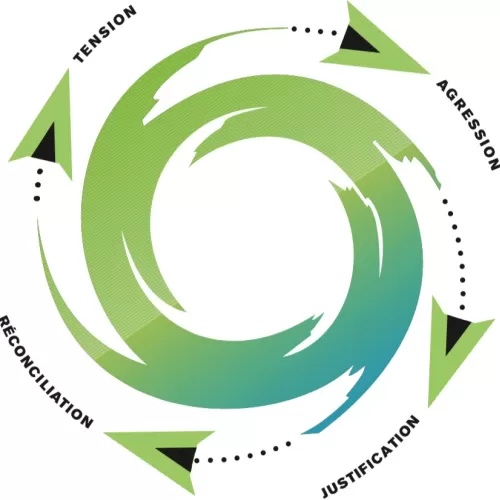Domestic violence
We all have a more or less precise idea of what violence is in general. But what do we really know about domestic violence?
Definition by the Government of Quebec
"Domestic violence includes psychological, physical, verbal, and sexual assaults as well as acts of economic domination. It does not result from a loss of control but, on the contrary, is a means chosen to dominate the other person and assert power over her. It can be experienced in a marital, extramarital, or romantic relationship, at any age."
In summary, domestic violence is
- A learned and chosen behavior.
- Intended to control, to have power.
- Aimed at destroying, harming (in various ways).
- And it happens repetitively (cyclically). Domestic violence not only has a social, emotional, psychological, or economic dimension. It also represents a criminal dimension as it can involve offenses such as assault, threats, or harassment.
Domestic violence not only has a social, emotional, psychological, or economic dimension. It also represents a criminal dimension as it can involve offenses such as assault, threats, or harassment.
Domestic violence always occurs within an intimate relationship; whether the relationship is current or past, whether the people live under the same roof or not, and whether or not there are children. Nothing predestines a woman to become a victim of domestic violence: neither her age, her social or economic status, her culture, or religion.
Alcohol, drugs, and stress can facilitate the expression of violence, but none of these elements can justify it; there are no substances or stressful situations that have the power to make someone violent against their will. The use of different forms of violence allows the aggressor to adapt his control strategies based on his partner's reactions.
"Domestic violence does not result from a loss of control but, on the contrary, is a means chosen to dominate the other person and assert power over her."
Sources: • violenceconjugale.gouv.ca, • INSPQ • http://www.lagitee.ca/femmes-5... • Quebec Government, intervention policy on domestic violence; prevent, detect, counter domestic violence, 1995.
Cycle of Violence
- This cycle is established and orchestrated by the aggressor (spouse, friend), it allows him to maintain his domination (control) over his spouse.
- In a domestic relationship marked by violence, this cycle repeats itself several times and at an increasingly accelerated pace.
- The cycle of domestic violence is a vicious circle that has four phases: tension, aggression, justification, remission (honeymoon).
- The more the cycle repeats, the shorter the remission phase becomes, until it disappears. With the regime of terror becoming more and more present, the aggressor no longer needs to make promises or excuses to maintain control. Similarly, the justification phase may also disappear, the aggressor no longer needing to blame his spouse because she herself attributes the responsibility for what happened.
Tension
Outbursts of anger, heavy silences, intimidations, threatening glances.
Anxiety: I feel it might go wrong, I feel worried, I put a lot of energy into reducing the tension, I'm scared: I freeze, I feel like I'm walking on eggshells.
Agression
Verbal, psychological, physical, sexual, economic.
Anger and shame: I am humiliated, I am sad, I feel a sense of injustice.
Justification
Makes excuses, explains why there was an outburst: The reasons are outside of him.
Taking responsibility:
- I will believe and understand his justifications,
- If I could help him change,
- I will adjust to him,
- I doubt my perceptions (is this really aggression?)
- I feel responsible and my anger disappears.
Reconciliation
Does everything to seek forgiveness, asks for help, talks about therapy, suicide.
Hope: I see his efforts to change, I give him a chance, I help him, I find the one I love, I change my attitudes.
The Consequences of Violence
Being a victim of domestic violence affects every aspect of life. However, this situation often goes unnoticed, as it is not immediately considered as a cause of the woman's symptoms. Symptoms may be attributed to a mental health issue, when it is rather the repercussions of the domestic violence endured.
Domestic violence is complex and takes on many forms. The process evolves over months or even years. Recognizing the violence, knowing what to do is not easy, yet it is important to act quickly. The longer you wait, the harder it is to get out. Difficult, but not impossible.
There are numerous impacts of domestic violence on women and children; here are some examples:
- Loss of self-esteem and self-confidence
- Decrease in assertiveness skills
- Symptoms of depression
- Fear, insecurity, anxiety
- Feeling trapped
- Consumption of alcohol, drugs, medication (antidepressants, painkillers, anxiolytics)
- Suicidal thoughts and urges
- Difficulties in making autonomous decisions
- Shame, guilt, embarrassment, resignation
- Social isolation
- Hiding the violence and pretending that nothing happened
- Ambivalence/feelings of guilt/powerlessness/injustice/anger
- Distrust
- Memory loss, decreased attention and concentration
- Difficulty setting priorities
- Wage losses
- Feeling like you're going crazy
- Feeling judged, misunderstood
The interveners at Mirépi, shelter house are there to help you understand and regain control over your life.


